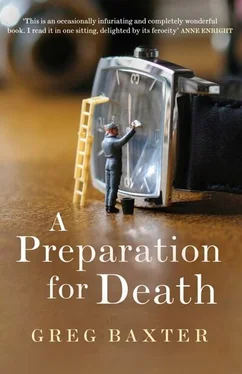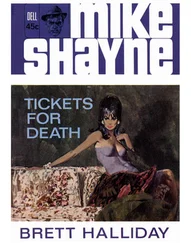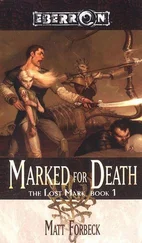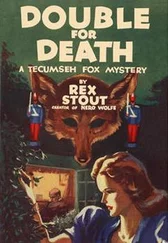A week ago I read through some of my old stories, which I wrote around the time I took the trip to Tennessee. Full of desire, of wanting, of an urge to be published, of ambition, there is within them all an explosive quaintness . They scored picayune truths. They deferred to bad influence. This is the effect of inclination: it obliterates difference.
I’ve stopped eating, for the most part. My liver is a brick. I sleep in my clothes. I shave twice a week. I have painful cavities. Maybe I’ll be dead in a year. What is the difference? When Priam came for the body of Hector, he told Achilles: Such is the way the gods spun life for unfortunate mortals, that we live in unhappiness .
I go to work. I teach writing classes. I drink on my own. I drink with my students after class, because I have exactly one friend left in Ireland, Henrik, and he has a life. I come home and write for nobody, for an audience of zero. I am incompatible with the concept of the future. How do I explain to anyone that such a life, however unsustainable, is my ideal?
A few days ago, coming home from the bar after class, sometime around midnight, I drove my Vespa to the docks in Ringsend, which is dramatically out of my way, and parked for a while beside my first apartment in Dublin. I used to jog there in the mornings, in the cold and sometimes rain, before the sun came up and the streets filled with traffic, past the toll bridge, beside the sleeping cottages, and I observed the blue mooing of cargo ships, the high clanks of crane activity, the idling of empty trucks. I saw no people. From time to time, through a frosty cottage window, I would be spied by a cat or dog. I ran for thirty minutes, up and down the street, without hope or desire, infinitely nobody.
Each writer at Sewanee got a twenty-minute one-on-one session with a faculty member of his or her choice, and on the third-to-last day of the conference I sat down with Barry. It was about ten in the morning. I was up early that morning with nerves. What did I have to say to him? I was aware that Barry had much more in common with Brent than with me — the humanity and wonder. This didn’t unsettle me. I didn’t want to be an acolyte, one of the so-called Sons of Barry. I was happy just to hang with the man who wrote Ray, Airships , etc.
We discussed my story for a while. We smoked a lot of cigarettes. We talked a bit about William Goyen, whose work I liked very much at the time. He told me to ask him for help, when I got a book together, because he was going to get my ass published, but I think he said that to a lot of people. Inexplicably we got on to the subject of SUVs. He loved them. He said he admired our red Cherokee — which was preposterous but true. He had a green Cherokee of his own and he said he felt like the captain of an aircraft carrier, driving it.
Then he said, I feel like a cheeseburger.
I said, That sounds nice.
He said, You feel like a cheeseburger?
I could eat.
Or do you want to catch the next reading?
I didn’t have the heart to tell him I didn’t know which reading he meant.
We drove around fairly aimlessly for about an hour, and I got the sense he hadn’t really wanted a cheeseburger after all. He just wanted to get away. We stopped at a gas station for cigarettes, and we loitered there a long time, since he said he liked to spend time in strange gas stations. He was not the man I had seen once before, at LSU, trim and handsome, with a full head of hair. He was swollen from his therapy, and his skin was pink and raw. His eyes, which were once little black marbles, bulged like eggs. Yet he retained his presence. He started to get worried that I needed a cheeseburger, so he asked some locals if they knew a place — not a drive-through but a diner. It was the experience of a cheeseburger he sought. They gave us complex directions, so he bought me some beef jerky and himself a fountain coke, but he couldn’t drink it.
You want to go back? he asked.
Not really, I said.
All right, he said — and he had a way of drawing this out, All right , which implied that we were going in search of some trouble.
We went to the Army/Navy store, a pilgrimage he made every summer in Sewanee. It was about twenty minutes’ drive from the gas station.
I love Army/Navys, he said. I’m fascinated with World War Two. I was born into it, and I feel like I fought it myself.
Yes, I said, though he had told me the exact same thing on two previous occasions.
The way out to the Army/Navy took us down a winding road, and he grew quiet. His smile disappeared. Instead of talking, we watched the landscape roll by. Woods and farms. Patches of traffic in the opposite direction. The day was hazy and warm and bright — even with sunglasses I had my hand above my eyes.
The Army/Navy was all by itself in a gravel parking lot. A few cars were parked in it, but not in rows. You just pulled in and stopped wherever you liked. He killed the engine, but rather than getting out, he sat with his eyes closed and breathed laboriously through his nose. I didn’t want to insult him by asking if he was okay. After a few minutes he shook off the nausea and stepped out.
The store might have said Army/Navy, but really it was a white survivalist shop. Knives, firearms, shovels, ammunition, and thousands of Confederate flags. There were some serious rednecks talking to the clerk, and they all looked me up and down — white T-shirt, cargo shorts, flip-flops, fancy chrome sunglasses. I might as well have been black. I got myself a souvenir — a grey NAVY T-shirt. When I went to pay, I found Barry talking to the rednecks. The rednecks were pontificating about the importance of the Confederate battle flag, about the history of the Civil War, the aggression of Federalism. If only they knew who they were talking to — the greatest Southern storyteller since Flannery O’Connor. Barry bought a Confederate flag bandana out of affection for irony.
One redneck said, They’re trying to take away our right to fly that. But they can’t take our history.
I waited. I wondered if Barry might say to them something like, You are going to waste your life believing in something that owns you; or, Say something wise for once in your life; or, Look what we did, are doing, to this place we pretend to worship; or, Perfect! We knew you’d be like that. These are the things his characters might say. Instead he looked angrily at the man, pointed his finger at the man’s bushy moustache (Barry has famous antipathy for the moustache — one always appears on characters he dislikes), and said, You’re goddamned right.
The redneck took a step back. Barry is five foot nothing, and with cancer very much an old man, but this large Tennessean got out of his way.
We got back in his Cherokee and he closed his eyes again. He asked if I minded driving, because he was not up to it. I couldn’t tell him I needed my glasses. I was totally blind to road signs, to distant traffic, to lanes. But I had to drive or we were never leaving. I couldn’t figure out how to move the seat back, and he was starting to fade out of consciousness, so I drove in his seat the way he had it. My knees were up around the steering wheel. I kept my elbows very high to avoid my knees, and my face was nearly at the window. I just tried to keep us on the road. When you have bad eyesight, often you don’t realize you’re blind until you need badly to see something.
After about twenty minutes, Barry woke up and smoked a cigarette. He looked at me with curiosity but said nothing. We spoke a little bit about Europe. He said he liked Paris. I told him I was probably going to leave the US one day, and for good.
Yes, he said. I can understand that.
At the beginning of our drive, he had said something about the daughter of a friend who was shot in a bank during a robbery. She lived, but she would never walk again. I wasn’t sure how to respond. Had he known the girl? How close was the friend? We were going through a little spot of earth with a few stores and gas stations — these places are not towns. I said, trying to conjure a little profundity: We are all at the whim of randomness.
Читать дальше












